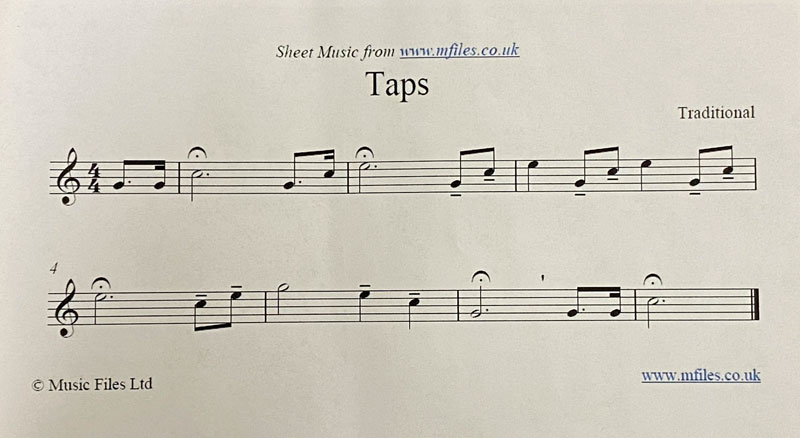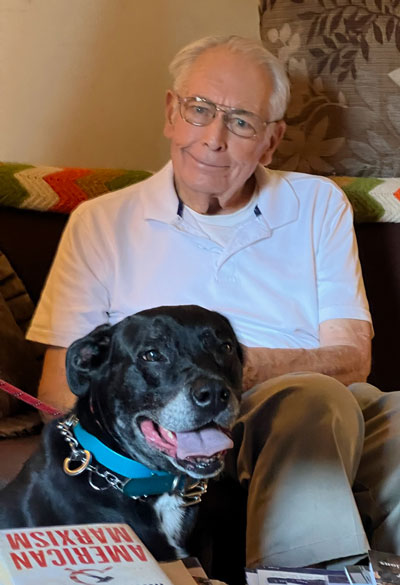24 Notes that Always Cause Us to Weep – The Story of “TAPS,” the Famous Bugle Call

What American in our time has not watched on TV or personally witnessed a military funeral for an honored countryman or woman who served his or her nation in some far off conflict, and who long ago or just recently “went home” to rest with his or her comrades? I find it hard to witness that solemn event, especially as “Taps” is played over the grave, without tears coming into my eyes. While I never had a relative or friend who was given this final honor in death, I know that many of you have had such. It is for you, and in memory of your loved one/s, and in honor of ALL of our military, both living and dead, from the first fallen warriors on the immortal Green of Lexington, Massachusetts who sacrificed their lives on April 19, 1775, to those who gave their lives just recently in the contentious, the senseless, and seemingly unending wars in Afghanistan and in the Middle East, that I write this tribute.
Of all of the bugle calls used by the military of the U.S. and other countries, the most recognized one, and the one that elicits the most emotions, is the one known as “Taps”. The 24 note melody is both memorable and haunting, but its origins have always been somewhat clouded in controversy. The British Army has used a similar call named “Last Post” in its military funerals since 1885. But “Taps” is unique solely to the U.S. Military and is used only at funerals, wreath laying, memorial services, and “lights out” at our bases at the end of each day. There are many stories in existence that purport to relate just how the trumpet (actually bugle) call known as “Taps” came to be, and when it was first used. From research done many years ago by Jari Villanueva, who was a Master Sergeant in a U.S. Air Force Band, I’ll try to tell some of those stories about the birth of “Taps”, particularly when it was first played. I’ve quoted freely from his article, “24 Notes That Tap Deep Emotions”, from 2001, in west-point.org/taps.
Those of us old enough recall, with great emotion, the horror of our modern “Day of Infamy”, Sept. 11, 2001, involving the cowardly and despicable attack on the New York World Trade Center and on our Pentagon by Islamic barbarians. We grieved then for the thousands of our countrymen and others who were killed in New York City, in Washington, D.C. and in Shanksville, Pa. For weeks after that event Americans heard those haunting 24 notes of “Taps”, as funerals for those murdered were held. Through our tears and soon our resolve to resist, that music seemed to comfort most of us, as it has given comfort—and closure-- to citizens and our military warriors ever since it was first played, probably in July of 1862. One of the most popular stories of “Taps’” origin supposedly recounts that a young soldier born in the North was killed while fighting FOR the South. The boy’s father, a Union officer named Robert Ellison, found his son’s body on the battlefield. In the dead boy’s pocket he found the notes to “Taps”. When Union General Daniel Sickles heard of this, he had those notes played at the young man’s funeral. As romantic and sentimental as this sounds, there is no evidence to prove this version of its origin or of the existence of a Captain Robert Ellison. As with many other hoary customs, this “origin” story is still told today, but is surely just fiction.
According to M.S. Villaneuva, the actual origin of “Taps” is as follows: The music, in a slightly different form, existed in a bugle call known as “Tatoo”, and may go back as early as the 1830’s. This early version was well known even before The War For Southern Independence, and was used as a signal for the end of the day. Supposedly, Union General Daniel Butterfield (1831-1901) was not pleased with that particular call for “lights out”. With the help of his brigade bugler, Oliver Norton, General Butterfield wrote (or probably revised the original music) what we know today as “Taps” to honor his men while in camp at Harrison’s Landing, Virginia, following the Seven Days Battle, which took place during the Peninsular Campaign of 1862. The bugle call, “Taps”, played that night for the first time soon spread to other units of the Union Army and was even eventually used by the Confederate armies. “Taps” became an official bugle call after the conclusion of the war, and although there was a degree of confusion about the origins of “Taps” for a decade or two following the war, both Oliver Norton and General Butterfield confirmed, in writing, the substantial accuracy of its origin.
The bottom line is that we Americans have been listening to the haunting notes of “Taps” for well over 150 years. Those 24 notes have never died away—they’ve never left the consciousness of Americans, and as long as America engages in “wars”, declared or not, for honorable purposes of the preservation of our Union, or for the endless undeclared and/or “no-win” conflicts that the U.S. has been engaged in since the end of WW11, they’ll undoubtedly never leave our national life. Every night of the year, wherever our Armed Forces are stationed, “Taps” is played. It has brought comfort and healing to the families of the fallen from that totally unnecessary and purposely caused insanity called, inaccurately, our “Civil War”, to the Islamic barbarian induced evil which overwhelmed Americans on September 11, 2001, to the never-ending and frustrating war in Afghanistan, going on now for almost 20 years with “possibly” an end in sight. The music of “Taps” helps bring closure not only to day’s end, but also to the families, friends, and loved ones who must struggle on after the funeral or memorial service of a military parent, spouse, child, relative, or friend.
Americans, sadly, have witnessed many military funerals in recent years, because the struggle continues between good and evil, between the forces of liberty and the forces of repression, between the Light of God’s Word and the Darkness of Satan’s Lies, between those who struggle to preserve the Constitutional Republic of our Founders’ Wisdom and its present day enemies who fight for the chaos of socialist “democracy” so longed for by the determined enemies of freedom. These struggles, sadly, will NEVER END until our LORD Jesus returns. It is only going to get worse in the years ahead because the barbarians are not “at the gates” any longer---THEY ARE AMONG US, plotting more death, more destruction, more elimination of our constitutional liberties and safeguards—more “death by a thousand cuts”—that freedom’s enemies have inflicted upon mankind since the “Prince of Darkness” promised our First Parents that they, too, could be ‘just like God’ if they’d only listen to him. Well, they did, didn’t they? With tragic consequences ever after!

So how did “Taps” come to be associated with funerals? In the U.S. Army Infantry Drill Regulations for 1891, “Taps” was mandated to be used at military funerals, even though it had surely been used unofficially long before that date, under its former name: “Extinguish Lights”. The first playing of “Taps” at a military funeral is commemorated in a lovely stained glass window at The Chapel of the Centurion at Fort Monroe, Virginia. Master Sgt. Villanueva tells the story: “The window, made by R. Geissler of New York and based on a painting by Sidney King, was dedicated in 1958 and shows a bugler and a flag at half staff. In that picture a drummer boy stands beside the bugler. The grandson of that drummer boy purchased Berkeley Plantation where Harrisons’ Landing is located. The site where “Taps” was born is also commemorated. In this case, by a monument located on the grounds of Berkeley Plantation. This monument to “Taps” was erected by the Virginia American Legion and dedicated on July 4, 1969. The site is also rich in history, for the Harrisons of Berkeley Plantation included Benjamin Harrison and William Henry Harrison, both Presidents of the United States and one (Benjamin) a SIGNER of the Declaration of Independence.”
Many different words have been associated with the music of “Taps”. While there are no official words to the music, probably the most popular verse goes as follows:
“Day is done, gone the sun,
From the hills, from the lake, from the skies.
All is well, safely rest, God is nigh.”
Keep those words in your minds, my fellow Americans. As the year 2021 begins to unfold, I fear that we’re going to need our Heavenly Father’s comfort more than we can imagine.













